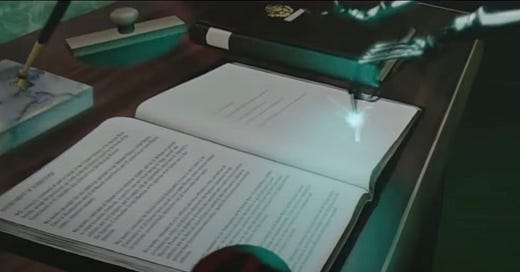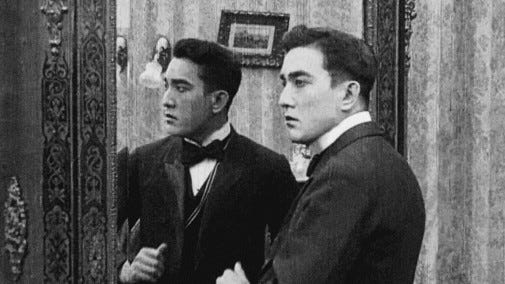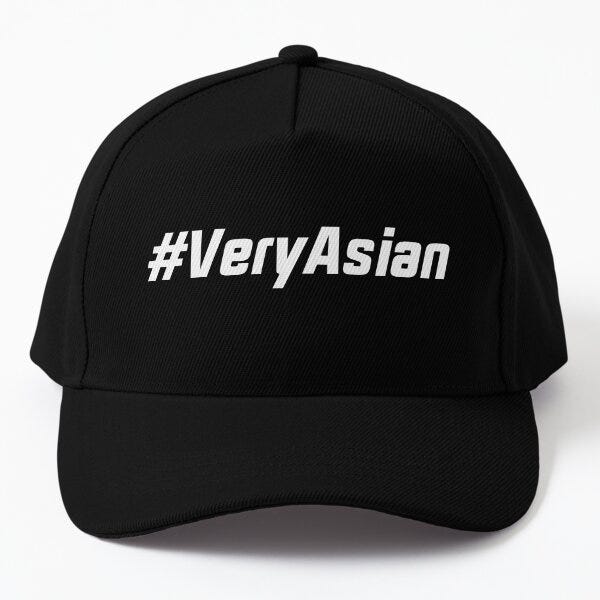They Were All Writing Like AI Anyway
The schadenfreude of watching the collapse of Buzzfeed (News), Vice, etc.
My head knows I should be sympathetic to all the writers getting laid off, that all those Millennial digital publications that were going revolutionize and democratize media but are now going under is a great tragedy that will lead to further consolidation of corporate media or, in an even more ghastly development, replace writers with AI. But my heart is more hesitant, asking what exactly are we losing?
Recently, I saw a Lee Fang tweet about how in one of Buzzfeed’s presentations to its investors, it proclaimed how AI would become instrumental in generating content, including in “develop[ing] Black, Asian, Latino identity-based content to help corporate brands tap an ‘authentic voice’ to sell products.” Much of the reaction was infuriated, demanding how on earth AI could ever generate anything authentic, especially to the unique black or Asian or Latino experience.
But a long-running joke among my friends—and I’m sure in a lot of other circles—is that much of professional online writing was AI-like anyway, especially for sites like Buzzfeed. I guarantee you that countless people have punched in cliched identity-based prompts into ChatGPT and gotten a good laugh (or a frightful chill if they were one of these idpol thinkpiecers themselves) on how indistinguishable the AI-generated pieces were from the usual slop you’d see from places like Huffington Post, Refinery29 (is it still around anymore?), and the like.
I can only really confidently speak about Asian American writings of this kind, but I’m quite sure it’s similar across the board for all races. There are a handful of favored topics, within which there are only a few favored ways to write about them. For us, there are the standby hits, our Hey Jude and Freebird. By now, everybody knows the stinky lunch story, where Asian Americans (often, well-educated culture-class types) write about their traumatic moments in middle school when they brought dumplings or whatever for lunch and their classmates scorned them. When I was in elementary school, I remember reading a story called The Sandwich, about a kid named Vincenzo who brings a mortadella and provolone sandwich to school and gets ridiculed by his PB&J-eating philistine friends. By the end, everyone realizes Italian sandwiches are delicious and all’s well that ends well. That story was published in 1975. That’s where we Asian Americans are, refusing to move on because it’s comfortable where it’s safe (everyone loves dumplings now).
Or how about another old classic, the melodramatic and wishfully overcomplicated narrative of the straight Asian American woman (and occasionally, the gay Asian American man) who just can’t quit white men and have made that their entire artistic personality? Every year, I can count on at least three or four of the same recycled pieces on this topic come out. This genre does seem to have run its course by now, but even just a few months ago, there was another one, this time in The Point, which suddenly time-warped me back to 2011. It reminded me of that quote from This Is Spinal Tap, where the band is being read their piles of negative reviews: “The musical growth of this band cannot even be charted. They’re treading water in a sea of retarded sexuality and bad poetry.” This topic can be interesting, and that Jenny Zhang article for Rookie Mag is an all-timer, but it’s always written in the exact same way from the exact same point of view.
There’s also the embarrassing Asian American male equivalent, the sadsack whimpering that doesn’t even arise to the level of whining about how unsexy they felt, how they never kissed a girl until 30, how their own mothers told them they were unfuckable. But of course, god forbid they express any fire or anger because that’s not what a good Asian American boy does and don’t worry, Glenn from The Walking Dead is going to change everything. And don’t forget the paragraph about how the Chinese coolies weren’t allowed to bring over their wives and how they were only allowed to work in laundromats and kitchens. Did you know Sessue Hayakawa was one of Hollywood’s first sex symbols?
I could keep going. How about ones where (usually Millennial) Asian Americans writes about how much they hated their language, their looks, and even their parents growing up, but then they saw how much non-Asians—to be honest, white people—loved Kpop or Kdramas or Crazy Rich Asians (or even more pathetically, To All The Boys I’ve Loved Before) and suddenly they discovered their love of being Asian. Or going off on the stinky lunch narrative, the freakouts over so-called cultural appropriation of Asian stuff, particularly food. I do think there are those Asian Americans, who’ve never had issues with their culture, who do have some right to feel miffed when some pretty young white women (and people always get maddest when it’s pretty young white women who do this) get love and attention and money for wearing a qipao to prom, writing a noodle cookbook, or selling overpriced mahjong sets. But in the media, the ones who complain are usually the same type of Asian Americans who didn’t want anything to do with Asianness until Blackpink performed at Coachella, so I give them no credibility.
Let’s also not forget the articles bravely defending corporation-universities with multi-billion-dollar endowments, all written by or about Asian Americans who have either graduated from such institutions or are currently attending them. I’ve already sort of written about them in my previous piece about campus novels, but I don’t see these types giving up their seats to underrepresented minorities for the sake of beautiful progressive diversity. No, they’re allowed to seek inclusion into the most elite of spaces; it’s just you who cannot.
Or how about how all those #StopAsianHate pieces that suddenly appeared in the wake of the Atlanta spa murders in the spring of 2021, many by the same people who’d been ignoring or suppressing any attacks/murders on Asian Americans because they weren’t committed by some disgusting little white guy with a horrible patchy beard, then just as suddenly disappeared when such an easy villain didn’t respawn? Even when Michelle Go and Christina Yuna Lee were viciously murdered in New York City, the most energy that was allowed to be expressed was that of eternal heartbreak, striking a beatific pose of resigned victimhood bathed in sunbeam, ideally through the bay windows of a Brooklyn brownstone. It’s not that I want more policing or strained race relations between Asians and other minorities. But for once, I want to see our so-called cultural representatives dare to be too gung-ho for the community they supposedly represent when things get complicated enough to threaten their precious place in the progressive ally coalition.
There’s something I’ve come to call the Baby Steps Fallacy, which assumes that any inroads made by someone from your group is positive because it will pave the way for better things. But that naively assumes that everybody has the same goal. Not everyone, even those supposedly in the same group, have the same agenda and interests. If you’re the type of Asian American writer who loves to write about all the things I’ve listed above, then why on earth would you want to make way for others, especially those who recognize your work as being insipid at best, and detrimental at worst? No, you’d make sure that only you and your ideological kin are invited in. Even if your parcel of land, whether it’s HuffPo Asian Voices or NBC Asian America or Joysauce, is tiny and not yielding bountiful harvests, it’s far better that you at least maintain control. As the old saying goes, those within an institution always care more about the distribution, and not the size, of the pie.
Cutting one’s nose to spite one’s face is a sad and self-defeating move. Yet every time one of these publications goes under and I see the avalanche of tweets proclaiming how the smartest, funniest, and most insightful minds of our generation were just laid off at X, I just have to laugh and silently retort that no, you all were mostly just standard-issue replacement-level journeymen (and journeywomen) who got to play at being writers during the brief do-what-you-love Millennial bubble, fueled by Silicon Valley’s Zero Interest Loan Culture Heaven (appropriately, “ZILCH”).
But the sobering fact is that if AI can replace writers, especially creative writers, what hope is there for the rest of society? We’ve always jealously upheld our creativity as the impregnable fortress safeguarding our humanity. Sure, the machines could do our labor, do our mundane administrative paperwork, and even beat us in games with strictly defined rules. But in expressing ideas and philosophies and make-believe stories? They could never. I’ve accepted the likelihood that in the next five years, my job will get taken over by AI. What keeps me chipper is that by the time that happens, AI takeover will probably be so widespread that at least the poorhouse or barricades will be full of lively company. Or more realistically, the PC rooms that can be rented for $10 for a month (complete with capsule bedroom and communal shower) won’t be so lonely.
Some of my more optimistic friends say that AI writing will be a blessing in disguise because it’ll make bad, or even average, writing redundant, thus placing more value on actual good writing. I sort of have to take this side, if only because no matter what, I myself will keep writing because what else am I going to do? But deep down, I have to accept the worst, that in the deluge of the kind of mass-writing that we’ve already gotten accustomed to in the past decade, nobody will really care to distinguish between the good and the bad. My friend Trevor Beaulieu meticulously kept track of Buzzfeed’s corporate statements for years, noting how from the very start, Jonah Perretti’s obvious intentions were to AI-ify everything. Buzzfeed had even first began as an AI chatbot! His theory is that Buzzfeed intentionally dumbed down internet writing because it knew that AI was too far off from actually emulating good writing, so it’d be far easier to degrade human writing, get us all used to it, then replace us all. It sounds all very plausible to me.
So here we are, facing a very uncertain future, only being able to cling to schadenfreude. When those super-cheap PC rooms start popping out, at least I’ll finally have time to play all the 90s computer games I bought years ago on GOG. First up: Freespace 2.







I agree with your other writer friends that AI will boot paint-by-numbers writers out of the profession. This could mean a renaissance where writers are actually forced to produce new and innovative work. We're heading into exciting times here.
Also, you forgot to mention the "We need to talk about anti-Blackness in the Asian community" essay. And the "Why the model minority is a myth" essay, with a quote about Hmong and Cambodian people.
I had subscribed to freelance writing newsletters recently, which profit off of someone using Twitter search for you. But I noticed that many calls for pitches on specialty websites, about music, food, games, regions, traveling, or for holidays and events, would often ask for "people of color," or "looking for LGBTQ+ writers." Without following up on what the articles look like, it's easy to imagine they are producing staid content, which has the adverse effect of limiting the experiential output we'd like to hear or only consolidating a specific ideology-- disguised as diversity. It's endemic of middle-content which pretends to be really reflective or essayist, though may be just newsworthy. You can probably find 30% to 50% of these call for pitches systematically reducing the amount of white people who write for them and I suspect the articles are much along the lines of the content slop that you've described.